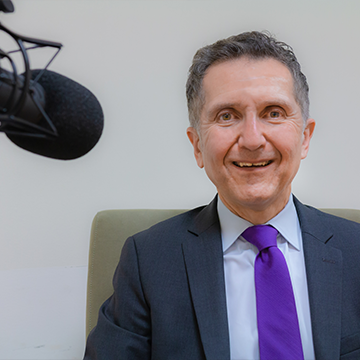The Urgent Need for New Uterine Fibroid Treatments with Serdar Bulun, MD
It is the most common tumor found in women and is the cause of 200,000 hysterectomies in the United States every year. Yet, uterine fibroids have not been a frequent topic of medical research. Northwestern’s Serdar Bulun, MD, leads one of the few research programs focused on the molecular and cellular abnormalities that may cause uterine fibroids and is investigating novel targets to treat the condition.

"Although we define uterine fibroids as a benign disease, it's not that benign. It destroys a lot of lives."
— Serdar Bulun, MD
- Chair, Department of Obstetrics and Gynecology
- Interim Chief of Reproductive Endocrinology and Infertility in the Department of Obstetrics and Gynecology
- John J. Sciarra Professor of Obstetrics and Gynecology
- Member of the Robert H. Lurie Comprehensive Cancer Center
Episode Notes
Serdar Bulun, MD, directs Northwestern’s Uterine Leiomyoma Research Center. His work has greatly advanced uterine fibroid research and many other understudied conditions that affect women’s health.
By age 50, about 70 to 80 percent of all women will develop uterine fibroids, noncancerous tumors also known as leiomyomas, and 15 to 20 percent of those patients experience severe symptoms that can include excessive uterine bleeding, anemia, recurrent pregnancy loss and fertility problems. Though fibroids are the most prevalent tumor in women, they have not been a frequent topic of research.
During the past decade he and his team of investigators have been awarded more than $20 million from the Eunice Kennedy Shriver National Institute of Child Health and Human Development to study uterine fibroids. His program is the only National Institutes of Health-funded basic science research program focusing on fibroids in the world. The most recent renewal of this grant came in August 2019.
Additional Reading:
- Bulun was the senior author of a study published in Stem Cell Reports about creating uterine stem cells for the first time
- A review article about uterine fibroids by Bulun, published in The New England Journal of Medicine
- Bulun's Northwestern Medicine doctor profile
Subscribe to Feinberg School of Medicine podcasts here:
iTunes
Spotify
Google Play Music
Recorded on October 4, 2019.
Continuing Medical Education Credit
Physicians who listen to this podcast may claim continuing medical education credit after listening to an episode of this program.
Target Audience
Academic/Research, Multiple specialties
Learning Objectives
At the conclusion of this activity, participants will be able to:
- Identify the research interests and initiatives of Feinberg faculty.
- Discuss new updates in clinical and translational research.
Accreditation Statement
The Northwestern University Feinberg School of Medicine is accredited by the Accreditation Council for Continuing Medical Education (ACCME) to provide continuing medical education for physicians.
Credit Designation Statement
The Northwestern University Feinberg School of Medicine designates this Enduring Material for a maximum of 0.5 AMA PRA Category 1 Credit(s)™. Physicians should claim only the credit commensurate with the extent of their participation in the activity.
Disclosure Statement
Serdar Bulun, MD, has nothing to disclose. Course director, Robert Rosa, MD, has nothing to disclose. Planning committee member, Erin Spain, has nothing to disclose. Feinberg School of Medicine's CME Leadership and Staff have nothing to disclose: Clara J. Schroedl, MD, Medical Director of CME, Sheryl Corey, Manager of CME, Jennifer Banys, Senior Program Administrator, Allison McCollum, Senior Program Coordinator, and Rhea Alexis Banks, Administrative Assistant 2.
